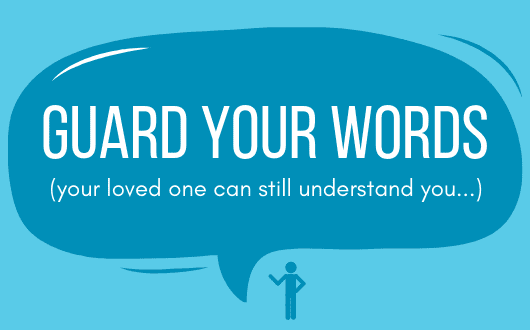Guard Your Words
Thursday August 30, 2018

All too often we hear caregivers talk about their loved one with dementia as if that person is not there. What caregivers don’t realize is the impact words still have on their loved one. I don’t think family members are ill intentioned and meaning to talk about their loved one in a negative way. Families are stressed and seeking help and connection with others when they can get it.
Research shows that those with dementia (even those in the final stages) can understand what is being said. Let’s reemphasize that point because it’s so important: THEY CAN UNDERSTAND YOU. They may not understand everything you say, but bits and pieces sink in, and you never know which those will be.
When talking with someone with dementia it is so important to be respectful. Do not talk about that person as if he/she is not there. Instead, try to include your loved one in the conversation to the extent possible. It’s demeaning to have a conversation about your loved one in front of him/her.
Imagine this: you hear your spouse talking on the phone with a friend about your bad habits. What is your reaction? It’s a horrible feeling to hear yourself talked about negatively. You would not be happy with your spouse or the friend. However, we do this to our loved ones. He/she is standing next to us, and we discuss recent behaviors with others.
Always assume that they can understand what you are saying.
Or how about this example: you take your loved one to the doctor and start unloading about your loved one’s recent behavioral issues and changes in functioning. I don’t know about you, but if I ever take my husband to the doctor with me and the doctor asks about my diet and exercise, my husband better sit VERY quietly next to me as I talk about my excellent diet and exercise (even though the truth is that I just finished a Snickers in the car). I would be furious if my husband outed me to the doctor. Wouldn’t you?!
Instead of talking to the doctor in front of your loved one, have a private discussion with the doctor to talk about issues that might make your loved one feel embarrassed.
Even those who cannot express themselves verbally can still understand what is being said.
In an article in Coming of Age Magazine, summer 2018 issue, Brian LeBlanc writes about his experience as a person with dementia and how he is trying to erase the stigma associated with the disease. He often hears the words, “I know you may not remember, but…,” before someone tells him something. He says that he hears people ask, “So, how is he doing?” when he is standing right there and could answer for himself. He talks about how people assume that he can’t answer for himself. He feels “dismissed.” “I was shoved in a corner as if I didn’t matter.” This is NOT how we want our loved ones to feel.
Talk TO your loved one. Speak words of love. Words of affirmation. Words of affection. Words of kindness. Words of acceptance. Words of understanding. Words of respect. If you must talk about your loved one, do so as if they fully understand what you are saying. The more that we treat our loved ones with respect, the more others will see that and follow suit.
(You can find issues of Coming of Age Magazine here. Brian’s article is in the Summer 2018 issue starting on page 20.)




